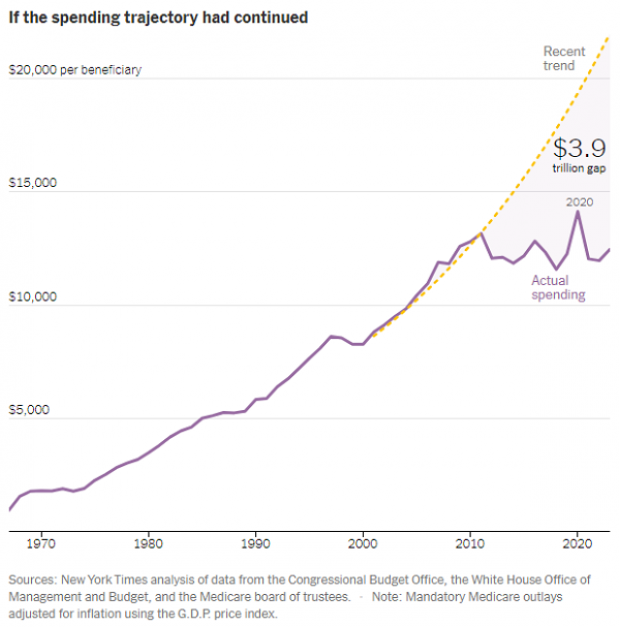Something strange has been happening with Medicare, The New York Times reports: “Instead of growing and growing, as it always had before, spending per Medicare beneficiary has nearly leveled off over more than a decade.”
If Medicare’s spending per beneficiary had continued along the trajectory it had been on two decades ago, the program’s spending from 2011 until now would be some $3.9 trillion higher and deficits would have been more than a quarter larger, according to an analysis by The Upshot, part of the Times site.
“Without a doubt, this is the most important thing that has happened to the federal budget in the last 20 years,” David Cutler, a professor of health policy and medicine at Harvard, told the Times. Cutler helped the Obama White House develop the Affordable Care Act, which appears to be one reason for the shifting trendline.
Margot Sanger-Katz, Alicia Parlapiano and Josh Katz of the Times note that scholars have been debating the causes of the slowdown in per-person spending. “Some of the reductions are easy to explain,” they write. “Congress changed Medicare policy. The biggest such shift came with the Affordable Care Act in 2010, which reduced Medicare’s payments to hospitals and to health insurers that offered private Medicare Advantage plans. Congress also cut Medicare payments as part of a budget deal in 2011.”
But most of the savings relative to earlier projections are harder to attribute, the authors write. Americans appear to be having fewer heart attacks and strokes, which cuts health care costs. The absence of expensive new blockbuster drugs and treatments could also be a factor. And the country’s medical system has become more cost-conscious as well: “Parts of the health system appear to have become more efficient, as medical providers have been more cautious about adopting new therapies without much evidence, and more care has shifted outside hospitals into cheaper settings,” the Times team writes.
Still a concern: The improved per-person trend may have allowed policymakers to put off debates about changes to Medicare, but Medicare is still growing faster than the rest of the federal budget and still faces budgetary uncertainty. “Medicare’s spending is unlikely to disappear as a concern for the budget and policymakers,” the Times notes. “An aging population means the number of Americans relying on the program is growing rapidly. And analysts continue to worry that the trend is an aberration, and that some new development — an effective Alzheimer’s drug, a cultural turn away from cost cutting, the health burden of long Covid or some other chronic condition — will return Medicare spending to form.”






